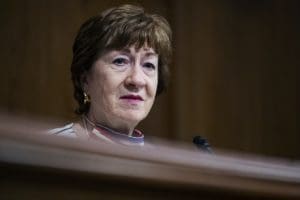Susan Collins refuses to endorse Trump because she's 'in a difficult race'
Collins trails Democrat Sara Gideon by 4 points in the latest Maine Senate poll.

Sen. Susan Collins (R-ME) said Tuesday that she would not choose sides in the 2020 presidential race because of her own “difficult race.”
Last week Collins, who is serving her fourth term in the Senate, told reporters that she would not endorse Donald Trump’s reelection — or speak against him — because she is also running for reelection in November. She noted that “in parts of the state President Trump is very popular, in parts of the state he’s very unpopular.”
During an appearance on CNN on Tuesday, she said, “I have a difficult race. And I am concentrating my efforts on that race.”
Collins is correct about the challenge she faces.
A poll of Maine voters conducted by Public Policy Polling July 2-3 found the Democratic candidate for the Senate seat, Maine House of Representatives Speaker Sara Gideon, leading Collins 46% to 42%.
Gideon has raised more money for her campaign than Collins in the past two quarters. Between April and June, Gideon raised $8 million to Collins’ $3 million. Despite Collins’ incumbency, Gideon has outraised her overall, by almost $24.2 million to $16.8 million.
In addition, Gideon will receive $3.7 million in raised through crowdfunding for the eventual Democratic nominee after Collins voted to confirm Brett Kavanaugh to the Supreme Court in 2018.
Gideon easily won the Democratic primary for the Senate seat last week.
Several of Collins’ former backers have switched sides for this race.
The Human Rights Campaign, which had previously backed Collins, announced last week that it would endorse Gideon. According to the Washington Post, he group’s president, Alphonso David, said in a statement: “Despite Susan Collins’ record of support on certain key LGBTQ issues, her support of Mitch McConnell and Donald Trump’s agenda, endorsement of Brett M. Kavanaugh’s appointment to the Supreme Court and failure to hold Donald Trump accountable, is simply untenable.”
Planned Parenthood, which last backed Collins in her 2002 race and honored her with its Barry Goldwater Award in 2017, endorsed Gideon in January. Of Collins, Alexis McGill Johnson, president and CEO of Planned Parenthood Action, said in a statement: “From her decisive vote to confirm Kavanaugh to her refusal to stop Republican attacks on our health and rights, it’s clear that she has turned her back on those she should be championing.” Abortion rights group NARAL Pro-Choice America, which backed Collins in 2002 and stayed neutral in her past two elections, endorsed Gideon last June.
The League of Conservation Voters endorsed Collins in her previous races, but backed Gideon in November. The League of Conservation Voters Action Fund tweeted on Nov. 14: “From her time as a town councilor to her tenure as Speaker of the Maine House of Representatives, Speaker Gideon has been a leader fighting the climate crisis, promoting clean energy, & banning offshore drilling in Maine.”
But the biggest challenge for Collins may be Trump. The same July poll that showed her trailing Gideon also found Joe Biden leading Donald Trump among Maine voters by a margin of 53% to 42%.
Collins’ base of Republican voters approves of the job Trump is doing 83%. But as of 2017, Pew Research Center notes, Republicans make up only 36% of the Maine electorate. Some 89% of Maine Democratic voters disapprove of Trump’s job performance, as do 57% of independent voters. Overall, 55% of Maine voters disapprove of Trump, with 41% approving of the job he’s doing.
Collins faces similar dynamics with her own rating, with 36% of all voters polled approving and 55% disapproving.
If she comes out strongly against Trump, Collins risks alienating Republican voters, 63% of whom currently approve of her. But by a 46% to 42% plurality, according to the Public Policy Polling survey, Maine voters think Collins is “more a partisan voice for Donald Trump and Mitch McConnell” than she is “an independent voice for Maine,” with 11% saying they were unsure.
Collins has tried to have it both ways regarding Trump since 2016, frequently expressing concern about his actions and words but also voting with him most of the time.
On at least 24 occasions, Collins has indicated her disappointment and displeasure with the actions of Trump and his administration.
But since Trump’s inauguration, she has voted with him more than two-thirds of the time, according to FiveThirtyEight. She voted to confirm the vast majority of Trump’s 200 judicial appointees, including Supreme Court Justices Kavanaugh and Neil Gorsuch.
She also voted to acquit Trump during his impeachment trial in February, suggesting that he had learned a “pretty big lesson” from being impeached and “would be more cautious in the future.” She later admitted that claim had been “more aspirational on my part.”
A Collins campaign spokesperson said in an email that Collins had been “very clear” about her rationale for staying out of the presidential race: “She said her race was ‘difficult’ meaning hard or arduous… so she is ‘concentrating,’ or focusing, her attention on ‘that’ by which she means her own race rather than presidential politics.”
The subhead of this story was updated to correct the name of Susan Collins’ rival, Sara Gideon.
Published with permission of The American Independent Foundation.
Recommended

New NC GOP chair flirts with bogus stolen election conspiracies
Simmons predecessor was a staunch 2020 election denier
By Jesse Valentine - April 19, 2024
Texas activists pushed abortion restrictions in NM cities and counties, records show
Emails reveal influence and control in exchange for promises of legal help
By Austin Fisher, Source NM - March 04, 2024
Cannabis workers across Missouri begin push to unionize dispensaries
The first day was a breeze. Sean Shannon and Danny Foster walked into several marijuana dispensaries around Missouri with their matching “Union For Cannabis Workers” shirts and talked to employees about the possibility of unionizing. “The first day, there were 57 stops amongst the teams,” said Shannon, lead organizer with UFCW Local 655, which actually […]
By Rebecca Rivas - December 04, 2023









































































